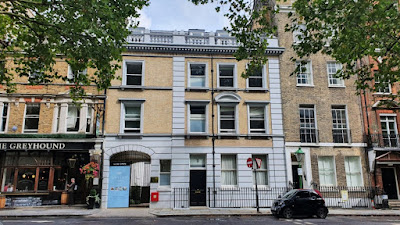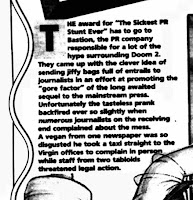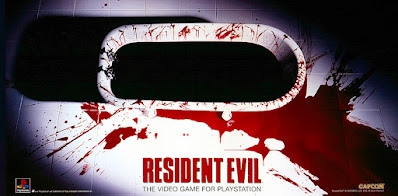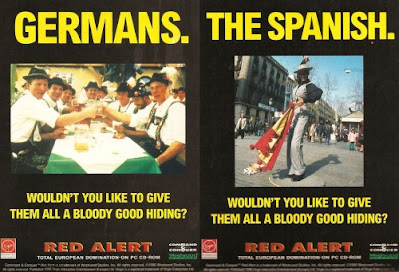@338a Ladbroke Grove, London, W10
This post should have been easy to write. I worked for Virgin Interactive Entertainment for several years but the words seemed to drip onto my keyboard and lacked any real impact. That's wrong for this incarnation of Virgin Games (parts one and two of the story are here) because the company was all about buzz and sensation (or hype and cheap shock tactics, if you are more cynical). Then I found a link to a Kickstarter for Sex, Drugs & Video Games! The 90s Virgin story- London & LA by Tim Chaney, Managing Director. The "warts and all" story of the company's rise to fame "or more correctly infamy," It sounds like an amazing work of gonzo journalism. Hyperbolic. Bombastic. Pyroclastic. It doesn't match my memory of working there but I was in the basement.
16 Portland Road, London, W11
A lot of the story about Virgin Interactive Entertainment -as the company finally became known in 1994- is corporate. Who owned who and what company brought out what percentage of shares. This tale of IPOs and MBOs and other MBA jargon is documented better on the Wikipedia page but it needs to be understood because without it Virgin Interactive Entertainment (I'll call them VIE to save wear and tear on the new keyboard I've stolen from work) couldn't have got away with what it did for several years. I'll try to whiz through it and talk about the adverts because in some ways that's Virgin's real legacy.
But first, the formation of Virgin Games mark II. Richard Branson covers its creation in a couple of paragraphs of his biography, Losing My Virginity, but he mangles the fine detail, and adds a kick boxer.
Before starting
discussions to sell the Sega licence, Robert had hived off the small
team who wrote the software programmes into a separate company called
Virgin Interactive. In 1990 the next wave of technology would be
games which were played on compact disc, and Robert commissioned a
number of software writers to come up with programmes for CDs.
Without Sega and Sonic the Hedgehog to worry about, the tiny team of
software programmers that Robert had assembled in America began to
devise a new game for CD-ROM technology. They named it ‘The 7th
Guest’, and I noticed that people were growing increasingly excited
about it. It was a game that involved battling your way through a
haunted house while all kinds of attacks were launched at you without
warning.
‘I’ve no idea what
happens in this game since I’m always killed by the kick boxer in
the first room,’ Robert told me. ‘All I know is that these guys
tell me that The 7th Guest is going to be big. They say it’s way
ahead of anything else on the market.’
The making of The 7th Guest is covered elsewhere on the internet. It was the baby of Martin Alper, cofounder of Mastertronic, who moved to the US to set up their American division and stayed part of Virgin when most of the others moved to SEGA with Virgin Mastertronic. The thing about VIE is, it's much more of a US company. The foundations were laid in America where Virgin brought out Westwood Studios (developers of Dune 2 and Command and Conquer) and developed games like Cool Spot and Aladdin. This attracted the big corporate beasts who ended up owning VIE. The process started with Hasbro, who brought a small chunk of the company in 1993. Then Blockbuster Entertainment got involved because they wanted to expand their business beyond videotape rental. Blockbuster brought several bigger chunks of VIE across 1994, including Hasbro's bit, and then because they also owned a large chunk of Spelling Entertainment (makers of many fine television programmes and even more rubbish ones) they transferred control of VIE into the Spelling Group. Then Blockbuster merged with Viacom, which meant Viacom controlled Virgin through Spelling.
It feels like I'm telling the story backwards when I write about the European arm, but it was all this macho high-stakes corporate shenanigans that created a unique business environment. There was very little oversight of the London arm because none of the companies that passed VIE round and round like a parcel had time to get to grips with what they'd brought before ownership moved on again; when Viacom finally did in 1997 it was the beginning of the end. The story of Virgin in the nineties is the story of accidental laissez-faire corporate management and, more importantly, the story of European Managing Director Tim Chaney; the author of Sex, Drugs & Video Games! I don't want to tread on Tim' s toes too much because it really is his story to tell. Also, I'm slightly scared of Tim Chaney. He obviously revels in his reputation as a hard-nosed hard-boiled hard-partying businessman and I feel you should be wary of someone Monsignor Bruce Kent of CND reportedly described as a "horrible little man,"; although Tim didn't really deserve that because the US Gold game Raid Over Moscow wasn't his fault at all. I'm getting ahead of myself. It's 1991 and Virgin Games are still in Portland Road, near Holland Park.
 |
| October 2022 |
A lot of the information in this blog comes from the Kickstarter page for Sex, Drugs & Video Games!, this gamesindustry.biz article about the book and also this fine interview with Tim Chaney conducted for The Retro Hour*podcast. Virgin chat starts at the 50 minute mark.
* in a two fingered gesture of scorn to Einstein, The Retro Hour lasts 74 minutes.

2 Kensington Square, London, W8
 |
| August 2022 |
VIE made another move in 1995. The timing makes me think this was connected to the purchase by Blockbuster Entertainment. The new office was a very posh five story building just off Kensington High Street. It's not the building one can see in the photo above, the VIE building is through the arch with the blue door. I had planned to nip through the arch and get a picture of the old building proper but it's been converted into a care home. The office was very swish. I sat in the basement gazing out of what passed for a window and wondering if it was night or day while upstairs the beautiful people partied, apparently. I can't confirm or deny any of the hedonistic stories Tim Chaney tells about life at VIE. We didn't have a photocopier for anyone to sit on. I can however exclusively reveal that my fellow basement dwellers occasionally referred to Tim Chaney behind his back as Mr. Grace, after the owner of Grace Brothers Store in Are You Being Served. This was because some unutterable swine (it was me) drew a connection between his rare visits to the basement and shouts of encouragement as he disappeared back towards the lift, with Mr Grace's trips to the shop floor, "you've all done very well!"
I don't have a lot of memorabilia from my time at VIE. A quick inventory shows it's just three things. Two white label (VIE's budget rerelease label) games, Day of the Tentacle and a copy of TIE Fighter signed by Dave Prowse. When he wandered into the office there was a made scramble to find anything remotely Star Wars themed for him to sign. Plus a slightly threadbare Raccoon City Police department baseball cap which was part of the promotional merchandise for Resident Evil 2.
“Virgin Interactive is outside of the core asset base,” was the doomfull quote supplied by a Spelling spokeswoman. It's corporate-speak for "we wanted in on the gaming boom, now we want out." Spelling was looking to sell the company but no one wanted to buy all of VIE. What companies wanted was the American arm which had access to Westwood Games and the Command and Conquer franchise. Spelling kept the whole company up for sale for a year which unfortunately generated a lot of uncertainty about the future that resulted in the loss of European business partners like LucasArts. When Viacom finally bowed to the inevitable they split the company and sold the US side to Electronic Arts. When news of the EA sale broke I commented that if anyone wanted to find me, I'd be by the fax machine sending out my CV. A quip which went down just about as poorly as you'd expect. The same year a management buyout secured the European division, and Tim Chaney became president.
74A Charlotte Street, London W1P
 |
| August 2022 |
Tim Chaney notes in his Retro Hour podcast interview that the advantage of the Virgin name was its rock and roll associations. "You could basically do anything, anything, behind that brand and people think, 'oh it's just Virgin'." "People tried to copy our advertising style which was controversial. We were there to shock you into buying products like Resident Evil." It's always difficult to pass judgement on deliberately controversial advertising campaigns because they're designed to provoke. I'm always left feeling that if you make any comment then the advert has, for want of a better word, won. Invariably I end up playing the role of Bill Grundy interviewing the Sex Pistols in 1976; raising a faux-jaded eyebrow, pretending to be above it all, and saying "go on say something outrageous." It doesn't seem like the right response. Anyway, with that said, I can now have my cake and eat it by inviting you to look upon and be shocked by these deliberately shocking VIE adverts, and don't forget to tell all your friends so they can come and be shocked as well:
Virgin's Most Controversial Adverts Which You Just Won't Believe! (number 3 will make your jaw drop!!)
1) Earthworm Jim (1994)
 |
| SEGA MEGAZONE February 1995 page 6 |
Offensiveness rating: Johnny Rotten tells Bill Grundy that Beethoven, Mozart, Bach and Brahms "really turn us on."
 |
| Evening Herald, 7th January 1995 |
Offensiveness rating: Bill Grundy goads Johnny Rotten into saying "shit".
C) Earthworm Jim 2 (1995). In December 1995, advertising industry magazine CAMPAIGN asked, "Do shock ads harm advertisers' health?" noting: "Only a week after the
Advertising Standards Authority sharply warned advertisers against
flouting its guidelines, Virgin Interactive Entertainment is
preparing to do just that." This time the slogan was "Protect your worm from the evil pussy," while another "features the worm in a
suggestive position with a cow, accompanied by the words ‘Introduce
your worm to some livestock’." No word on whether the ASA stepped in this time.
Offensiveness rating: Siouxsie
Sioux tells Bill Grundy, "I always wanted to meet you," and he replies with, "we'll
meet afterwards, shall we?"
 |
| Twitter @EWJNoContext |
∞) Command & Conquer (1995)
VIE scored twice with this billboard campaign. First, people objected to the images of Hitler, Stalin, and other mass murderers. The Independent ran a scathing editorial by journalist Tom Wilkie (2nd October 1995) "It's not witty. It's crass, ignorant and stupid." The French embassy also protested to the Advertising Standards Authority over the photograph of then President of France Jacques
Chirac -included because he resumed French nuclear tests in the Pacific. The ASA required Virgin to take the advert down but instead the company visited each billboard and covered Chirac with another picture -the internet doesn't record who. Tom Wikie ended his editorial, "I
hope Mr Chirac sues for every penny you have."
The Guardian pointed out that: "The decision to order VIE to amend posters comparing Jacques Chirac, the French President, to murderous dictators such as Hitler, Idi Amin and Stalin was announced not by the [Adertising Standards] authority itself but in a press release from VIE." (13th October 1995).
Offensiveness rating: Steve Jones calls Bill Grundy "a dirty bastard!"
Six) Resident Evil (1996). When I started work at VIE there was a light well outside the basement window, and this advert was on a hoarding on the back wall of the well. I like it a lot. A literal blood bath. It's a stark and clever image, and it reminds me of the theatrical trailer for The Shining.
Offensiveness rating: "Are
you serious or are you just making me... trying to make me laugh?"
 |
| Twitter @coolboxart |
 |
| Twitter @Lord_Arse |
How do you follow the "Previous High Scores" campaign? Out of context, these adverts for Command & Conquer: Red Alert now look like leftovers from the Vote Leave campaign. On Twitter there are mentions of a couple of variations, the Greeks, and one headlined "The English" over a picture of some Morris dancers. The English does strike a dim memory with me. There was a sense at the end of the nineties that racism and sexism were over*, and viewed through that prism -plus the possible existence of a similar poster for the English- you can see the campaign more in the spirit of the Asterix books; jolly fun for all pointing out the foibles and funny side of national identities. The problem is, these adverts look awful the moment you take them out of the context of the campaign. This was demonstrated when American magazine NEXT GENERATION (issue 27 page 19) ran an article about offensive adverts and captioned The Germans with: "even xenophobic ads are used in Britain".











No comments:
Post a Comment